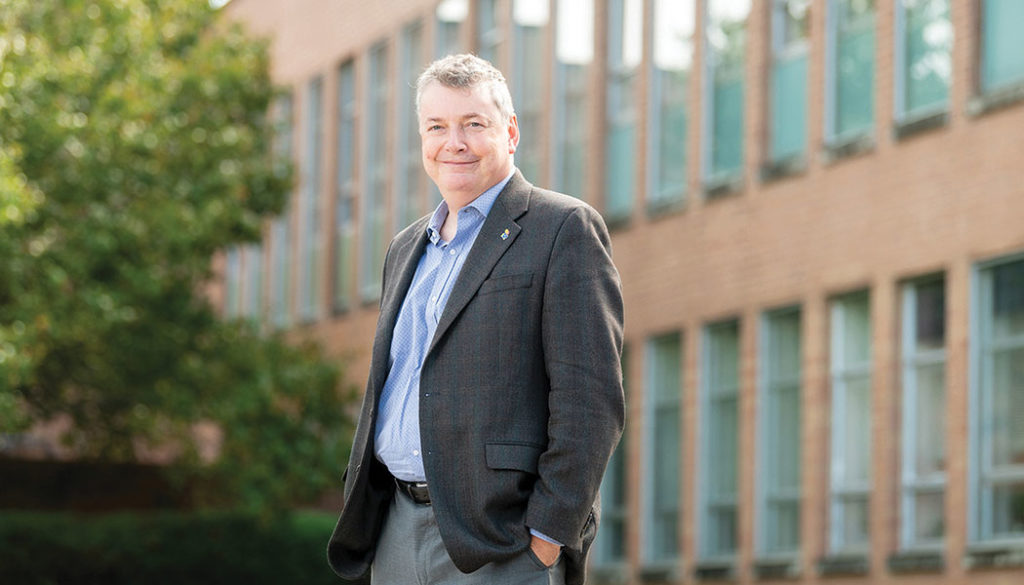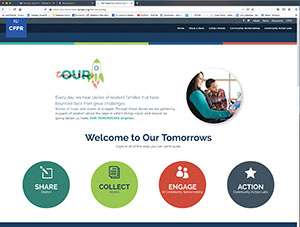Quests for discovery continue
As researchers scrambled to shut down, curtail or adapt their work in late March, Simon Atkinson made a solemn vow: “The KU Center for Research will do anything and everything we can to sustain research,” he declared March 27, in the first of several online town hall discussions to help the research community move forward.
Atkinson, vice chancellor for research, also tried to quell fears that remote operations could delay, detour or derail not only quests for critical discoveries but also personal career journeys for faculty members and graduate students. “This is not your fault,” he reminded them, assuring his colleagues that tenure clocks and deadlines for theses and dissertations would adapt to the interruption.

By mid-May, a few days into what Atkinson calls the “reawakening,” as the first research building reopened, he expressed thanks for the flexibility, ingenuity and heroism of scholars—and vital support teams, including KU Information Technology and KU Libraries—throughout a flurry of research activity that continued despite the spring closure of campuses.
“For scientists and engineers, there has been a lot of analyzing data for their projects. People are still able to access all the computational resources. The University’s IT folks did an amazing job of making sure all those resources, such as high-capacity computers, storage systems and other tools, were available,” he says. “In addition, many people have changed the ways they do their research with human subjects— the ways they gather information from schools and children and families, for example. We just don’t think it’s safe for those interactions, so they have been able to pivot their studies, using remote means, surveys or using Zoom to interview people. There’s a lot of that kind of work going on.”
Scholars have forged ahead on numerous research fronts, but studies related to coronavirus take on special urgency, including:
• studies analyzing the basic biology of coronavirus to create ways to block it from replicating (see “Virologist’s quest gains urgency”)
• new vaccines or delivery methods for new vaccines, including collaborations with other universities and foundations: “I think it’s quite likely that there will be some KU involvement in vaccines coming out,” Atkinson says. “There will probably be several new vaccines.”
• projects to improve diagnostic testing and provide alternatives to the current nasal swab method.
Other scholars applied their expertise to create studies that could help inform leaders in government and public health amid the pandemic:
• A team from the KU Biodiversity Institute and Natural History Museum earned a one-year, $199,999 Rapid Response Research award from the National Science Foundation to develop mathematical models predicting the effectiveness of various interventions to limit the spread of COVID-19. KU’s study is distinctive because it considers the impact of human behavior, including public fear, perception of risk and whether populations follow or flout public policies such as stay-at-home orders, social distancing and travel bans. The project is led by Folashade Agusto, assistant professor of ecology & evolutionary biology, who creates mathematical models of human and animal disease transmission. She is working with A. Townsend Peterson, University Distinguished Professor of Ecology & Evolutionary Biology and curator with the KU Biodiversity Institute and Natural History Museum, and Jarron Saint Onge, associate professor of sociology.
• The School of Engineering has partnered with the Kansas Department of Health & Environment (KDHE) to test whether COVID-19 can be detected in wastewater systems. Belinda Sturm, associate vice chancellor for research and professor of civil, environmental & architectural engineering, is analyzing the wastewater from 12 communities—from large cities to small towns. The results, though not a replacement for widespread COVID-19 testing of Kansans, could provide additional evidence for local officials. Tom Stiles, who directs KDHE’s Water Bureau, asked Sturm to help; the two have worked on several other water studies in recent years.
• The Center for Public Partnerships & Research (CPPR) reactivated its online story collection, Our Tomorrows, to gather personal stories of Kansas families and children coping with the pandemic. As of mid-May, Our Tomorrows had collected nearly 300 stories from Kansans who also answered a brief series of questions about factors such as unemployment or access to health care. Researchers analyze the data and share patterns with state policymakers. The study, funded by a federal grant from the Administration for Children and Families, aims to uncover and solve countless issues that affect families; CPPR director Jackie Counts, PhD’10, cites one example: “When child care centers reopen, how can we ensure that child care workers can get tested for COVID-19? They’re not always top of mind as front-line health care workers, but they are critical for reopening.” To share your story, visit ourtomorrows.kucppr.org.
• Donna Ginther, dean’s professor of economics and director of KU’s Institute for Policy & Social Research, and other experts presented weekly webinars to report the latest COVID-19 and economic data across all Kansas counties and the Kansas City metropolitan area, along with analysis of the economic toll.


The lull in normal operations also provided researchers the time to work on long-planned projects, Atkinson says: “Lots of papers have been written. Scientists are like other people. They’ve had papers they’ve been meaning to get to for months or years. Academic journals are receiving a lot more submissions than they usually do. Our researchers also have had more time to think; they are generating grant proposals and new lines of research, so our office is dealing with a lot of submissions.”
For faculty and students who rely on academic journals and other references for coursework and research, the KU Libraries staff stepped up to provide more avenues of access while libraries on all campuses remained closed to the public. In addition to the ever-popular Ask a Librarian online service and KU’s extensive digital collections, the HathiTrust Digital Library’s Emergency Temporary Access Service included 17 million digitized resources for more than 2 million volumes, about 40% of KU Libraries’ print collections. Students, faculty and staff also could request Home Loan Delivery of materials or ask librarians to scan as many as three chapters of books (adhering to copyright law) and send the digital files.
Of course, even KU’s vast collections and creative connections cannot substitute for travel to essential archives, often the summer assignment for humanities scholars. With restrictions most likely remaining through summer, some projects could be delayed by a year, Atkinson says.
Scholars in the arts also hit roadblocks. Although musicians in the KU Wind Ensemble valiantly converged in a popular KU video, melding their individual performances from home into a mournful but marvelous rendition of “Home on the Range,” the loss of valuable studio time affected numerous performing artists in music, dance and theatre.
To cope with the losses, KU leaders quickly fulfilled Atkinson’s promise to devise various ways of extending the tenure clock for faculty. For graduate students, advisers modified goals as best they could. “For me, as well as the chancellor and the provost, the impact on students is one of the main reasons why we wanted to reactivate research as quickly as we could,” Atkinson says, noting that dissertation defenses via Zoom lose much of their luster.
“These are examinations of students’ work, but they are also parties and celebrations of their achievements. That’s one of the things that we’ve lost. It’s not the same as having your mentors, advisers and perhaps family and friends in the room, waiting to celebrate your achievements. There is a lot of grieving.” (The disappointment is personal for Atkinson, whose eldest daughter, Daria, is preparing to complete her doctoral work in theoretical physics at the University of Massachusetts-Amherst and most likely will defend her dissertation without her dad and mom there to cheer.)
But as he surveys recent and looming challenges, Atkinson also finds solace. The pandemic has provided “a great demonstration of the importance of universities,” he says. “As COVID-19 emerged, we knew so little about how infectious it was going to be, how it is transmitted, how rapidly it would spread, how to treat patients, how to reorganize society to limit the effects of the pandemic. It is universities that have generated more of the ideas and have provided researchers who can come up with ways to analyze what’s going on rapidly, almost in real time, to help society and help medical professionals make the right decisions.
“Our ways of thinking have had to evolve very rapidly to keep pace, and those ways of thinking are what you learn in universities like KU.”
For the latest information on the numerous studies and outreach efforts led by researchers and other scholars throughout the University community, visit news.ku.edu/coronavirus.